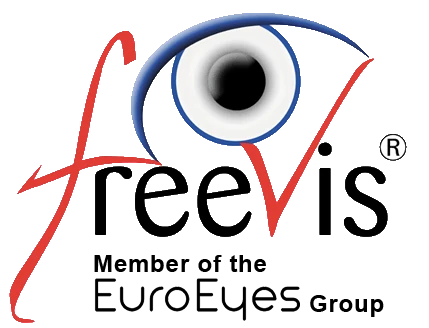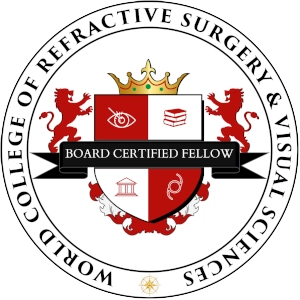Frequently Asked Questions
What you should know prior to your procedure
Will a procedure such as LASIK work for me?
In addition, there are a number of procedures available to correct even higher refractive errors (lens exchange, lens implants).
A final assessment can only be made after an eye exam and consultation.
Who should not have vision correction surgery?
Regardless of the type and severity of the refractive error, each patient must meet some criteria and conditions
in order to ensure an optimal success of the surgery.
Children and patients who are younger than 18 years should not receive eye laser surgery. The refractive error
should be stable (and the eye should have stopped growing) before the surgical procedure is performed.
Eye diseases such as cataract or glaucoma can contraindicate surgery and it is important to discuss them with
the ophthalmologist.
Because some general illnesses as well as some medications have an influence in the healing process of the
cornea, certain illnesses such as rheumatic arthritis can contraindicate surgery.
Treatment during pregnancy or while nursing is not recommended.
If you suffer from allergies, the surgery should be planned at an allergy-free time.
Can I wear contact lenses prior to the pre-op exam?
Yes! Contact lenses must only be removed 1-2 weeks prior to LASIK surgery. This will be explained to you in
detail during your preoperative exam.
» Course of your procedure at FreeVis
How long will I be unable to work?
Usually, you will reach a vision good enough to drive on the day after surgery. Therefore, you will be able to perform most tasks. To be on the safe side, we recommend that you'll take a few days off and relax.
What are the risks of surgery?
With today's procedures, the risk of serious complications is considered to be extremely low, less than 1%, but
cannot be excluded completely. Your ophthalmologist will inform you of your individual risk during your
preoperative consultation.
Please note:
The minimization of the risk to the presently lowest level depends on the experience of the ophthalmologist who
performs the procedure as well as on the patient's cooperation by closely following and observing the
postoperative treatment instructions.
Are long-term studies available?
For decades, ophthalmologists have been interested in developing procedures for the surgical correction of
refractive errors. José I. Barraquer (1916-1998) developed a rather successful method more than 40 years ago. He
dedicated his whole life and all his work to the idea of optimizing the refractive power of the eye by
"reshaping" the cornea. His "keratomileusis" was the foundation for the PRK and LASIK procedures used today and
made him the founder of refractive surgery.
The LASIK method has been used since 1991, and today it is scientifically accepted and established in
ophthalmology. The procedure itself as well as the equipment continues to be improved (See Femto-LASIK and
SMILE).
Lens exchange and lens implants have an equally long history (since the 1960ies).
What can you do to ensure good vision after LASIK surgery?
Do not rub your eyes for the first few days after surgery!
Use the eye drops you received on a regular basis and as prescribed.
Only use the eye drops for the length of time specified by your ophthalmologist; an extended time of use of this
highly effective medication may be harmful to your eyes.
Take advantage of the scheduled check-up visits.
Immediately contact your ophthalmologist if you experience severe pain or a sudden decrease in vision.
» Course of treatment at FreeVis
Will I experience any pain during or after the LASIK surgery?
No! Before your procedure, you will receive a tranquilizer and a pain reliever (tablets). Your eye(s) will be
anesthetized with eye drops, there are no injections necessary. The procedures are painfree, although you may
experience a foreign body sensation with itching and an increase in tears for the first few hours after surgery.
» Course of treatment at FreeVis
How long does the surgery take?
The surgery itself takes only a few minutes. Because your eyes will be examined before as well as after the
procedure, your total stay with us will be about one hour to 90 minutes.
» Course of treatment at FreeVis
Can I have surgery on both eyes at the same time?
This depends on the procedure.
We usually perform eye laser surgery such as Femto-LASIK or SMILE on both eyes on the same day. Of course we'll
use a separate sterile set of instruments for each eye.
At your specific request, we can also perform surgery on both eyes at different appointments.
Should you undergo lens surgery, both eyes will be operated on on two consecutive days.
How do I handle the time between the surgeries on both eyes?
Usually, eye laser surgery will be performed for both eyes on the same day. Therefore, this question applies
only for procedures such as lens implants or replacements.
If you wear contact lenses, you can manage the time between the surgeries without problem by continuing to wear
your contact lens on the eye on which surgery was not yet performed. But: Please take into consideration that
contact lenses may not be worn for 2 - 3 weeks prior to surgery.
If you wear eyeglasses, your choices are to leave the unoperated eye uncorrected by not wearing eyeglasses, or
you may continue to wear your eyeglasses after surgery on the first eye, which will create an unfocused image on
the operated eye.
How long will the treatment result last?
Our present knowledge shows that the results attained approximately 3 months after surgery will remain stable.
How many postoperative checkups will I need?
You will come to our LASIK center for a postoperative check-up on the day following your surgery. After that, we
usually refer you back to your primary eye care doctor.
Please make sure:
Attend all scheduled postoperative check-ups. They are an important part of the treatment and effect the final
result of the surgery.
» Course of treatment at FreeVis
What does the postoperative treatment consist of?
Usually, it is necessary to apply eye drops for a limited amount of time. It is extremely important that the
instructions given by the ophthalmologist are strictly observed, the postoperative medication treatment requires
regular check-ups!
If any problems should occur, the treating physician should be contacted immediately.
» Course of treatment at FreeVis
Which activities should I avoid directly after the surgery?
Physical activity, sports, tanning beds, saunas and swimming pools should be avoided for 1 - 2 weeks. Otherwise, simply take it easy and do whatever pleases you!
When will I be able to drive again?
You may operate a vehicle as soon as sufficient vision has been regained on the operated eye. After Femto-LASIK or SMILE, this is usually the case on the day after surgery.





